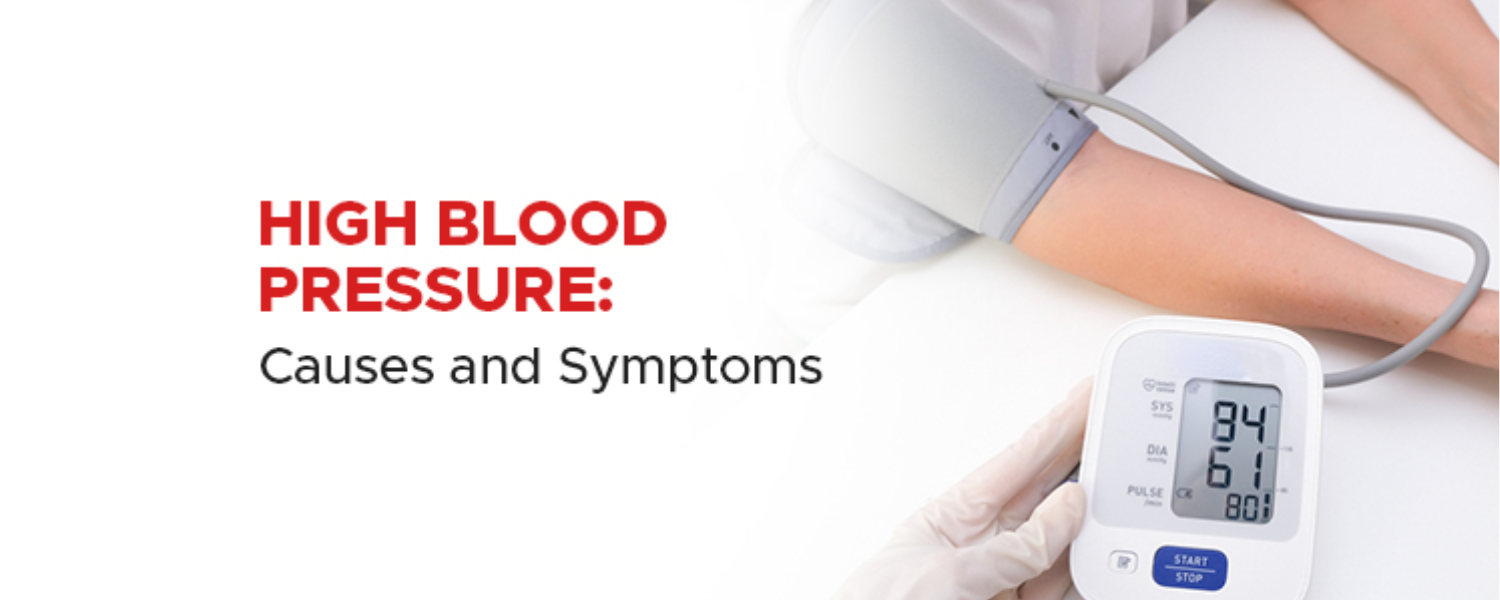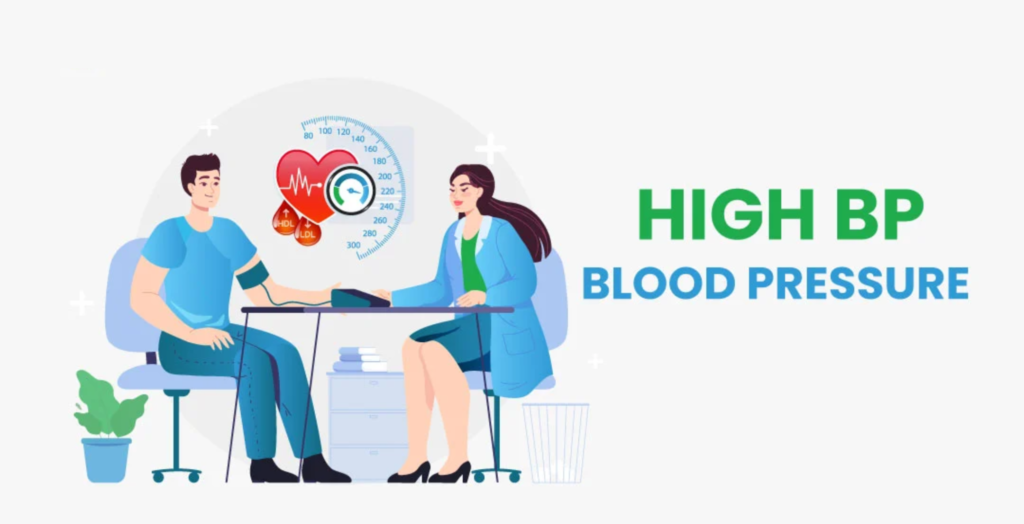Introduction
High blood pressure, also known as hypertension, is one of the most common health conditions worldwide. It affects millions of people and is often called a “silent killer” because it usually has no symptoms but can lead to serious health complications like heart disease, stroke, and kidney problems. Understanding the reason for high BP is crucial to managing and preventing this condition.
In this guide, we’ll explore what high blood pressure is, how you can identify it, its causes, and how it can be treated or prevented. We’ll also discuss some important factors related to hypertension, such as whether it’s genetic, the complications it can cause, and ways to achieve better health by managing your blood pressure.
What is High Blood Pressure?
High blood pressure occurs when the force of blood pushing against the walls of your arteries is consistently too high. Your heart pumps blood through your arteries to supply your body with oxygen and nutrients. When this pressure is higher than normal, it can damage your arteries and organs over time, leading to serious health problems.
Blood pressure is measured using two numbers: systolic and diastolic. The systolic number measures the pressure when your heart is beating, while the diastolic number measures the pressure when your heart is resting between beats.
How Do You Know If You Have High Blood Pressure?
Many people with high blood pressure don’t experience noticeable symptoms, which is why it can go undetected for years. However, some signs that may indicate high blood pressure include headaches, shortness of breath, dizziness, or nosebleeds.
The best way to know if you have high blood pressure is by getting it checked regularly. A simple blood pressure test can be done at your doctor’s office or even at home with a reliable blood pressure monitor.
What is Considered High Blood Pressure?
Blood pressure is classified into different stages:
- Normal: Less than 120/80 mmHg
- Elevated: Systolic pressure between 120-129 mmHg and diastolic pressure less than 80 mmHg
- Stage 1 Hypertension: Systolic pressure between 130-139 mmHg or diastolic pressure between 80-89 mmHg
- Stage 2 Hypertension: Systolic pressure of 140 mmHg or higher or diastolic pressure of 90 mmHg or higher
- Hypertensive Crisis: Systolic pressure higher than 180 mmHg or diastolic pressure higher than 120 mmHg, requiring immediate medical attention
If your blood pressure readings consistently fall into the elevated or hypertensive stages, it’s important to talk to your doctor about a treatment plan.
How Common is High Blood Pressure?
High blood pressure is incredibly common. According to the World Health Organization (WHO), an estimated 1.28 billion adults aged 30-79 worldwide have high blood pressure, with the majority living in low- and middle-income countries. It is also a leading cause of premature death globally.

Symptoms and Causes
What Are the Types of High Blood Pressure?
There are two main types of high blood pressure:
- Primary (Essential) Hypertension: This is the most common type of high blood pressure, and it develops gradually over time without a known cause. It is likely due to a combination of factors, including genetics, lifestyle, and aging.
- Secondary Hypertension: This type is caused by an underlying condition, such as kidney disease, hormonal disorders, or the use of certain medications like birth control pills. Secondary hypertension tends to appear suddenly and usually results in higher blood pressure than primary hypertension.
What Causes Hypertension?
There are many reasonsfor high BP causes, and often, it is a combination of several factors that lead to high blood pressure. Some of the most common reasons for high blood pressure include:
- Age: Blood pressure tends to increase as you get older.
- Family History: Genetic factors play a role in the development of hypertension. If your parents or close relatives have high blood pressure, you are more likely to develop it.
- Obesity: Carrying excess weight increases the strain on your heart and arteries, leading to higher blood pressure.
- Lack of Physical Activity: Inactivity can lead to weight gain and poor heart health, both of which increase the risk of high blood pressure.
- Diet: A diet high in salt, processed foods, and saturated fats can raise your blood pressure.
- Smoking: Smoking damages your blood vessels and raises your blood pressure.
- Alcohol: Excessive alcohol consumption is another major cause of high blood pressure.
- Stress: Chronic stress can contribute to hypertension, especially when combined with unhealthy coping mechanisms like overeating or smoking.
- Chronic Conditions: Conditions like diabetes, kidney disease, and sleep apnea are common reasons for high blood pressure.
Is High Blood Pressure Genetic?
Yes, high blood pressure can run in families. If your parents or other close relatives have hypertension, you are at a greater risk of developing the condition. However, even if high blood pressure is common in your family, you can still reduce your risk by maintaining a healthy lifestyle.
What Are the Complications of This Condition?
Untreated high blood pressure can lead to several serious complications, including:
- Heart Disease: High blood pressure increases the risk of heart attacks, heart failure, and other heart-related issues.
- Stroke: Hypertension can lead to the narrowing of blood vessels in the brain, increasing the risk of stroke.
- Kidney Damage: High blood pressure can damage the blood vessels in the kidneys, leading to kidney disease or failure.
- Vision Loss: Hypertension can damage the blood vessels in your eyes, leading to vision problems or blindness.
- Aneurysm: Aneurysms, or bulges in the blood vessels, can form due to weakened artery walls caused by high blood pressure. If an aneurysm bursts, it can be life-threatening.
How is High Blood Pressure Diagnosed?
High blood pressure is diagnosed through regular blood pressure tests. If your readings are consistently above the normal range, your doctor may run additional tests to confirm the diagnosis. These tests might include:
- Urine Tests: To check for kidney function.
- Blood Tests: To assess cholesterol levels and other health indicators.
- Electrocardiogram (ECG): To check for any issues with your heart.
- Echocardiogram: To get a detailed image of your heart and assess any potential damage.
What Are the Treatments for High Blood Pressure?
There are several effective treatments for high blood pressure, depending on the severity of your condition and underlying causes. These include:
- Lifestyle Changes:
- Healthy Weight Gain: Maintaining a healthy weight is crucial for reducing blood pressure. Losing even a small amount of weight can make a significant difference.
- Exercise: Regular physical activity helps strengthen your heart, reduce stress, and improve overall better health.
- Diet: A heart-healthy diet like the DASH (Dietary Approaches to Stop Hypertension) diet is rich in fruits, vegetables, whole grains, and lean proteins. It limits salt, red meat, and sugary foods.
- Limit Alcohol and Quit Smoking: Reducing alcohol consumption and quitting smoking can help lower blood pressure.
- Stress Management: Techniques such as meditation, yoga, and deep breathing can reduce stress and improve optimal health.
- Medications:
- Diuretics: Help your body get rid of excess sodium and water.
- Beta-Blockers: Reduce your heart rate and the force of your heartbeat.
- ACE Inhibitors: Help relax blood vessels.
- Calcium Channel Blockers: Prevent calcium from entering heart and artery cells, relaxing the blood vessels.
Your doctor will determine the best treatment plan based on your individual needs and health status.
Can You Prevent High Blood Pressure?
Yes, high blood pressure can be prevented or managed by making certain lifestyle changes. Here are some tips to help reduce the risk of developing hypertension:
- Maintain a Healthy Weight: Regular exercise and a balanced diet can help you maintain or achieve a healthy weight.
- Eat a Healthy Diet: Focus on fruits, vegetables, whole grains, and lean proteins. Reducing your salt intake is especially important.
- Exercise Regularly: Aim for at least 150 minutes of moderate exercise each week.
- Limit Alcohol: Keep alcohol consumption to moderate levels.
- Don’t Smoke: Quitting smoking is one of the most important steps you can take to improve your health.
- Manage Stress: Find healthy ways to cope with stress, such as exercise, relaxation techniques, or hobbies.
Conclusion
Understanding the causes of high blood pressure and taking action to manage it is vital for long-term health. By recognizing the main causes of high blood pressure, such as genetics, diet, lifestyle, and stress, you can work towards preventing and controlling this condition. Whether through lifestyle changes or medication, managing your blood pressure is crucial for achieving optimal health and reducing the risk of complications like heart disease, stroke, and kidney damage.
By adopting healthier habits, such as maintaining a healthy weight, exercising regularly, and eating a balanced diet, you can reduce your risk of hypertension and enjoy better health. Incorporating practices from cultures known for their health optimization, such as the Indian for Optimize Health, can also be beneficial.
FAQ
1. What is high blood pressure?
High blood pressure, or hypertension, occurs when the force of blood pushing against the walls of your arteries is consistently too high. It increases the risk of heart disease, stroke, and other health issues.
2. What are the main causes of high blood pressure?
The main causes of high blood pressure include age, family history, obesity, lack of physical activity, an unhealthy diet (especially high in salt), smoking, excessive alcohol consumption, and chronic stress. Some medical conditions, like diabetes and kidney disease, can also cause hypertension.
3. How can I tell if I have high blood pressure?
Many people with high blood pressure don’t have noticeable symptoms. Regular check-ups with a blood pressure monitor are the best way to know. If you do have symptoms, they might include headaches, dizziness, or shortness of breath.
4. What is considered a high blood pressure reading?
A reading of 120/80 mmHg or lower is considered normal. High blood pressure is defined as:
- Stage 1 Hypertension: 130-139/80-89 mmHg
- Stage 2 Hypertension: 140/90 mmHg or higher
- Hypertensive Crisis: Over 180/120 mmHg, which requires immediate medical attention.
5. Can high blood pressure be cured?
High blood pressure cannot be cured, but it can be effectively managed through lifestyle changes (like diet and exercise) and medications. With proper treatment, you can reduce your risk of complications and improve your overall health.

